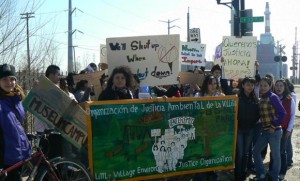
Research shows that carbon offsets aren’t working to reduce greenhouse gas emissions and stall global warming. That’s why RAN has founded the Climate Action Fund.
In theory, a carbon offset is a reduction in emissions of carbon or greenhouse gases made in order to compensate for or to offset an emission made elsewhere. Rather than reduce its own pollution, for example, a business would pay someone somewhere else in the world to reduce their greenhouse gas emissions, and then take credit for their contribution.
Sounds good, but does it really work?
A recent report estimates that of the $700 million dollars that are invested in carbon offsets around the world, offset buyers
are often buying vague promises instead of the reductions in greenhouse gases they expect. They are buying into projects that are never completed, or paying for ones that would have been done anyhow, the investigation found. Their purchases are feeding middlemen and promoters seeking profits from green schemes that range from selling protection for existing trees to the promise of planting new ones that never thrive. In some cases, the offsets have consequences that their purchasers never foresaw, such as erecting windmills that force poor people off their farms. Carbon offsets are the environmental equivalent of financial derivatives: complex, unregulated, unchecked and – in many cases – not worth their price.
Stanford University researchers found that up to 2/3 of offsets in international markets are not delivering any additional reduction in emissions compared to business as usual, which means that buyers are getting ripped off and the offsets are doing nothing to slow climate change. The attempt to “buy” our way out of climate change has left us with a corrupt system with little accountability where very little is done to reduce emissions.
At RAN, we began the Climate Action Fund (CAF) to take a fundamentally different approach. Starting with our own organization, we calculate the annual carbon emissions associated with our operations, including travel. We then apply an internal price — effectively a tax — on that carbon. These modest revenues are then invested directly in frontline community groups that are organizing against the extraction and combustion of dirty fossil fuels in the first place.
The Climate Action Fund is also open to individuals and businesses that want to participate in CAF-supported efforts to tackle the root causes of climate change. The CAF contributes 100 percent of donations directly to community organizations that are fighting to protect land and people, as well as to keep millions of tons of CO2 in the ground.
Rainforest Action Network is inspired by the work these frontline community groups are doing and honored to be able to support and promote their amazing work. We hope to be able to get more and more progressive organizations and companies involved with the CAF and learn how to green their business, reduce their carbon footprint and make direct contributions to groups on the frontlines of the battle to end our addiction to dirty fossil fuels and reduce dangerous carbon emissions contributing to climate change.